13 .02.2019
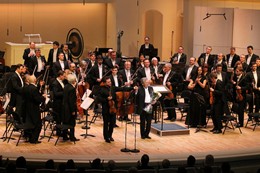
none
none
Complete
Works
Academic
Edition
Music
Production
International
13 .02.2019

none
27 .04.2017
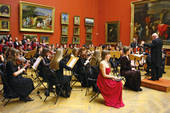
Performers: O. Georgieva (soprano), Ju. Ljubimova (mezzo-soprano), N. Aliev (tenor), A. Udalov (bass), Choir of the Theatre of Opera and Ballet of the St Petersburg Conservatoire, Youth Symphony Orchestra of the St Petersburg Conservatoire conducted by A. Štejnluht In the Academic Edition of P. I. Tchaikovsky’s Complete Works, in the first volume of Series IV, the cantata To Joy is for the first time published in full accordance with the author’s score. The inaccuracies and errors of the first edition, both in music and in verbal text, have been amended. These include, in particular, misprints in music text, missing dynamic signs and verbal instructions, missing part of cymbals in one of the excerpts, erroneous readings of the poetic text in several places, etc. Curiously, in the autograph score there are three instances where the string instruments have to play chords that cannot be performed; in the first edition, these errors remained uncorrected. All such instances are mentioned and commented in the textual study section. In the large-scale introductory article to the volume, the compositional history of the cantata is related in detail, the sources of its poetic texts are analyzed, all the available manuscript materials (the autograph full score, the manuscript orchestral and choral parts, the copy of the full score, and the posthumous arrangement for voices and piano done by Ju. Pomerancev) are described and examined.
07 .03.2017

Performers: A. Aglatova (soprano), S. Radchenko (tenor), choir of Wiener Singverein, and the P. I. Tchaikovsky Grand Symphony Orchestra conducted by V. Fedoseev. In the third volume of Series I, P. I. Tchaikovsky’s second opera Undine is published, the music of which is for the most part lost. Composed during six months of the year 1869, the opera remained unperformed in Tchaikovsky’s lifetime. In 1870, only a concert performance of three excerpts from the first act took place at the Bolshoy Theatre in Moscow. According to Tchaikovsky himself, the manuscript of Undine was destroyed by him in the 1870s. Traces of the music from Undine are found in some other works by Tchaikovsky, such as the Second Symphony, the music to A. N. Ostrovsky’s spring tale Sneguročka (The Snow Maiden), and the ballet Swan Lake. Tchaikovsky’s opera Undine is for the first time published on the basis of all the available sources. The opera’s scholarly reconstruction after the extant fragments and the description of its compositional history are based on historical documents, Tchaikovsky’s letters, relations of his biographers and contemporaries. The volume includes full scores and arrangements for voices and piano of five excerpts from the opera’s first and third acts: Introduction, Song of Undine (act I), Finale of Act I, March (act III), and Duet of Undine and Huldbrandt (act III). The Duet was reconstructed in 1958 by the composer V. Ja. Shebalin after Tchaikovsky’s extant draft for the opera Undine and the Duet of Odette and Siegfried in the autograph full score of the second act of the ballet Swan Lake, the latter duet being partly based on the musical material of the Duet of Undine and Huldbrandt.
10 .05.2015
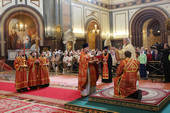
In his sermon delivered to the faithful after the liturgy, the Primate of the Russian Orthodox Church said, in particular: ‘Today, we are celebrating the 175th anniversary of Pyotr Il’ich Tchaikovsky’s birth. Today we enjoyed his music, since he composed, among other works, the chants of the Holy Liturgy, performed now by the choir of the Cathedral of Christ the Saviour. How it is possible to create such a harmony? How it is possible to create such a beauty? And how one can penetrate into the depths of the universe, formulating its laws in the form of mathematical formulae? Is it possible without inspiration? No, it’s impossible. And inspiration is just the ability to receive the signal sent to man by God, the ability to breathe the power of His Divine Spirit. Pyotr Il’ich Tchaikovsky was a man who was able to receive this gift. People enjoy his music not only in the expanses of our Motherland, but also in the whole world, for his oeuvre is rich in very special insights, expressing the laws of harmony in a way that is consonant with the mind of those who listen to his music – and therefore it ennobles a human soul’.
09 .02.2015
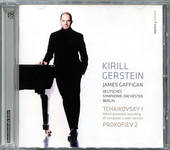
The Arts Desk 14th February 2015 “This [Tchaikovsky] concerto can be a bit of a slog, but never so here…James Gaffigan gets superb support from the Deutsches Symphonie-Orchester Berlin, and keeps things moving in the closing minutes…Gerstein's fearless stamina gets him through the [Prokofiev's] vast cadenza with unerring ease, and he's alert to the music's pain and dislocation...All superbly recorded and well annotated.” 15th March 2015 “Zimmermann and Hoppe capture the poetry of these works, in their hands free from sentiment and rich as short stories.” March 2015 ***** “Perhaps the most striking aspect of Gerstein's interpretation is his ability to make the piano writing sound much lighter and more transparent than usual...Instead of the conventional barnstorming bravura, Gerstein brings poetry, balletic grace and an infinitely wide range of timbres. Yet in no sense does the performance seem understated.”
24 .01.2015
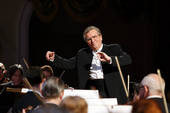
The project of the Academic Edition of P. I. Tchaikovsky’s Complete Works started with four volumes of Series III, ‘Concertos and Concert Pieces’, prepared under the scientific supervision of P. E. Vajdman. These volumes contain full scores and arrangements of two authentic versions of the Concerto No. 1 for piano and orchestra op. 23 (edited by P. E. Vajdman and A. G. Ajnbinder). The first version (1875), shortly after its completion, was performed by such outstanding musicians as H. von Bülow, S. I. Taneev, N. G. Rubinstein and others. In this version, the Concerto has become known worldwide. The full score of the first version is published for the first time. The second version (after 1879) became firmly established in the repertoire of pianists, as well as in the repertoire of Tchaikovsky himself as conductor. After Tchaikovsky’s death, the music text of the Concerto underwent some noticeable changes, made by some of his contemporaries. The publication of the First Concerto’s two authentic versions in the project of the Academic Edition of P. I. Tchaikovsky’s Complete Works will enrich the repertoire of contemporary musicians with two self-sufficient editions of this famous work.
22 .05.2014
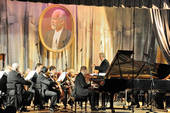
The project of the Academic Edition of P. I. Tchaikovsky’s Complete Works started with four volumes of Series III, ‘Concertos and Concert Pieces’, prepared under the scientific supervision of P. E. Vajdman. These volumes contain full scores and arrangements of two authentic versions of the Concerto No. 1 for piano and orchestra op. 23 (edited by P. E. Vajdman and A. G. Ajnbinder). The first version (1875), shortly after its completion, was performed by such outstanding musicians as H. von Bülow, S. I. Taneev, N. G. Rubinstein and others. In this version, the Concerto has become known worldwide. The full score of the first version is published for the first time. The second version (after 1879) became firmly established in the repertoire of pianists, as well as in the repertoire of Tchaikovsky himself as conductor. After Tchaikovsky’s death, the music text of the Concerto underwent some noticeable changes, made by some of his contemporaries. The publication of the First Concerto’s two authentic versions in the project of the Academic Edition of P. I. Tchaikovsky’s Complete Works will enrich the repertoire of contemporary musicians with two self-sufficient editions of this famous work.